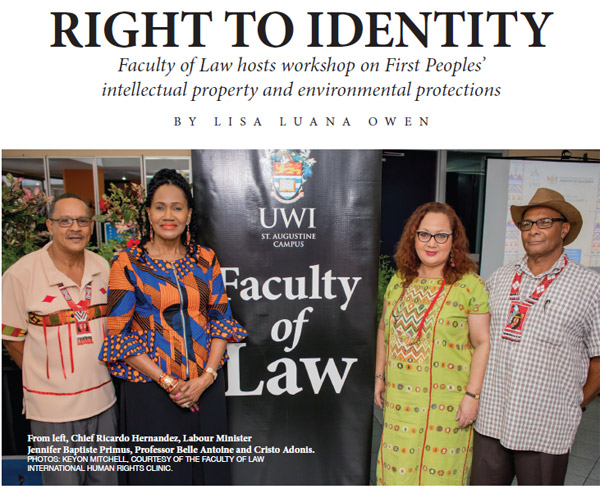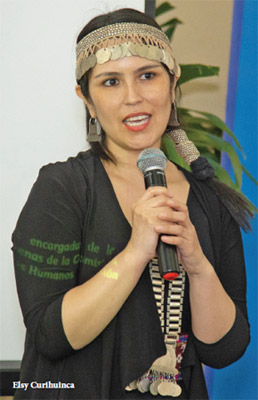
 Imagine that you live peacefully in a self-sufficient, close-knit community whose spiritual and cultural beliefs and practices are at one with the environment. Then imagine strangers arrive from a far off land to claim your land as their own, slaughter your comrades, disrespect your philosophies, ridicule your way of life, dispossess you of your land, and purge you of your inherent human rights of dignity and identity. Imagine that you live peacefully in a self-sufficient, close-knit community whose spiritual and cultural beliefs and practices are at one with the environment. Then imagine strangers arrive from a far off land to claim your land as their own, slaughter your comrades, disrespect your philosophies, ridicule your way of life, dispossess you of your land, and purge you of your inherent human rights of dignity and identity.
This is what the indigenous peoples of Trinidad and Tobago faced when the colonials invaded in 1492 in what their descendants refer to as a “terrorist attack” on the nation’s first peoples.
Today indigenous peoples and their “hard-fought” rights are still being threatened by the advent of extractive industries as well as the longstanding inadequacy of efforts placed on protecting and leveraging their intellectual property (IP) and environmental rights. While their beliefs and customs continue to be mocked and ridiculed by the lesser enlightened in our society.
Speaking at a recent workshop hosted by UWI’s Faculty of Law (FOL) entitled “Protecting Intellectual Property and the Environmental Rights of Indigenous Peoples of Trinidad and Tobago”, Santa Rosa First Peoples’ Community Chief Ricardo Hernandez, said indigenous peoples still suffer from high levels of invisibility, and the continuity of historical injustices have greatly challenged their ability to preserve their cultural identity as it relates to language, food, music, spiritually and protection of the environment as a whole.
But help, in the form of education and advocacy, is on the way.
FOL Dean and President and Former Rapporteur on the Rights of Indigenous Peoples Inter-American Commission on Human Rights (IACHR) OAS, Washington, Professor Rose-Marie Belle Antoine said, “The story of our indigenous peoples is in truth one of human rights. Sadly however, too often it is about violations of those rights by imperialists of apathetic uncaring states. It involves genocide and cultural loss, but also defiance, resistance and survival”.
“The First Peoples of T&T are still at the stage of reaffirming their cultural identity and patrimony, necessary prerequisites to their full recognition and of deserving entitled legal subjects of a nation that embraces history and corrects wrong,” stated Professor Antoine.
“For indigenous communities, relations to the land are not merely a matter of possession and production but a material and spiritual element which… are premised on community and harmony, and is not about individual greed and possession,” she explained, adding that it was widely believed at an international level that the traditions of the indigenous people is more conducive to sustaining the Earth through broader notions of collective rights and responsibility to the land we share.
She said the main purpose of the workshop was to harness the knowledge of the first peoples of Trinidad and Tobago by providing them with concrete tools of law in relation to Intellectual Property (IP) and Environmental Rights to protect and preserve their contributions, interests and resources. “We see law as an instrument of positive social change centred in its rightful place, the community. We do not see law and legal education as only for lawyers and elitists, rather we want to use law to empower.”
 Also speaking at the workshop was Minister of Labour and Small Enterprise Development, Senator the Honourable Jennifer Baptiste Primus, who urged the indigenous people of Trinidad and Tobago not to lost heart. Also speaking at the workshop was Minister of Labour and Small Enterprise Development, Senator the Honourable Jennifer Baptiste Primus, who urged the indigenous people of Trinidad and Tobago not to lost heart.
“The reality is that the current IP system was developed to meet the needs of an industrial society and the protection of IP rights of indigenous peoples are of a much more recent vintage. We are a culturally rich country and I am sure that you would agree with me that we could do more to secure our culture and heritage,” commented the Minister.
Held on February 23 2019 at UWI’s Faculty of Social Sciences (FSS) Conference Lounge, the packed workshop included several members of the First Peoples’ community of all ages. Participants also included those with an interest in intellectual property, indigenous languages, traditional medicine, environmental advocacy, government policy as well as members of the legal fraternity.
First Peoples speakers and presenters included Roger Belix, President of the Partners for First Peoples Development; Cristo Adonis, who presented on traditional medicines and products of the Santa Rosa First Peoples; and Elsy Curihuinca, an attorney at the Rapporteurship on the Rights of Indigenous Peoples of the IACHR.
Presenters from The UWI included Dr Justin Koo (lecturer from FOL), on intellectual property to commercialise First Peoples’ products; Dr Sharon Le Gall (senior lecturer, FOL) on protecting indigenous medicine; John Knechtle (senior lecturer at FOL) on environmental conservation; and Dr Roger Hosein (senior lecturer at FSS) and Rebecca Gookool (researcher at FSS) on supporting microenterprise development for First Peoples.
The workshop was part of a broader work revolving around a two-year donor project funded by the European Development Fund entitled “Strengthening Trinidad and Tobago’s Human Rights Capacity through Innovative Legal Education Building”. It involves an innovative legal education concept integrating the Faculty’s new International Human Rights Clinic and corresponding LLB course with NGOs, special interest groups, the State, faculty, staff, students and practicing attorneys within a dynamic programme of advocacy, activism, litigation and research.
The project is being administered by the Ministry of Education and includes persons deprived of liberty, including refugees, persons on remand, indigenous peoples, children’s rights, disability law and gender.
Lisa Luana Owen is a freelance writer, event coordinator, PR strategist and traditional and new media marketing consultant. |





